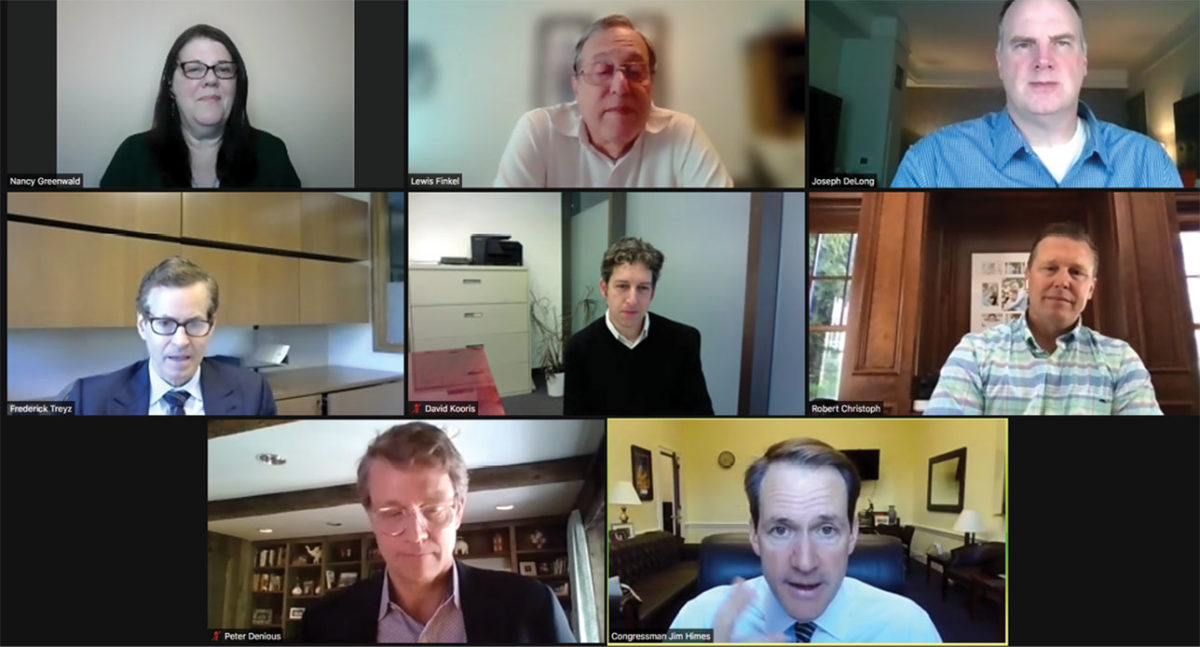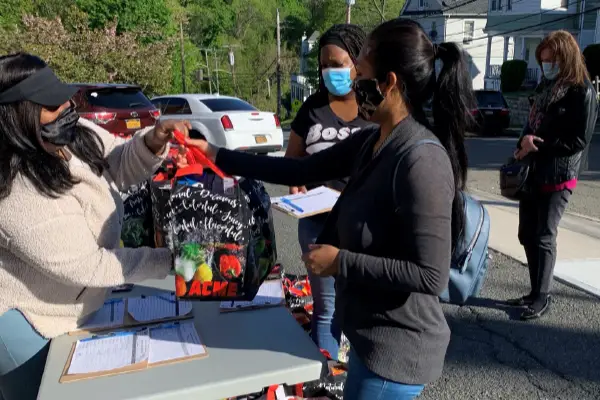Fairfield County and Connecticut at large are living in an unusual time ”” both in a positive and negative sense.
That was one of the themes of a wide-ranging discussion on emerging trends held virtually by The Construction Institute on May 13. Speakers at the “2021 Fairfield County Owners Forum” included RCI Group President Robert Christoph Jr.; Connecticut Conference of Municipalities Executive Director and CEO Joe DeLong; Stamford Downtown President David Kooris; and AdvanceCT President and CEO Peter Denious.
 Prefatory remarks were supplied by U.S. Rep. Jim Himes, whose district includes 16 county municipalities, including Bridgeport, Fairfield, Greenwich and Stamford.
Prefatory remarks were supplied by U.S. Rep. Jim Himes, whose district includes 16 county municipalities, including Bridgeport, Fairfield, Greenwich and Stamford.
“This moment is unique,” Himes said. “It gives us some possibilities we might not have imagined five years ago.”
Thanks to the billions of dollars in federal aid due to the state, “We are briefly not resource-constrained” to reshape both Connecticut and the Northeast, Himes said.
“We are going to get an infrastructure deal done here in D.C.,” which he estimated would be closer to President Joe Biden”™s proposed $2 trillion plan than the roughly $700 billion favored by some Republicans.
The Democratic congressman said that those funds should be used to address shortfalls in energy, education, access to health care and broadband internet. “The need has never been so evident,” he said.
“Every 20 years there”™s this moment where you can be transformative in terms of who we are as a country,” Himes continued. Although “we have an attention deficit in Congress,” he said that the state”™s entire Congressional delegation ”” all Democrats ”” is in agreement about addressing the aforementioned issues, among others.
The latter point was indirectly addressed by DeLong after Himes”™ departure. When he joined the Connecticut Conference of Municipalities six years ago, he said he could look around a table of its members and have “no idea who was a Democrat or a Republican,” given the nonpartisan challenges of doing business. That, he said, is no longer the case.
“We have to find a way to push back against” today”™s fierce partisanship, he said. “It”™s going to be a huge hindrance if we don”™t get on the other side of it. We need to discuss policy as policy, not policy as a political position.” The nation has been “evolving quickly in the wrong direction over just the past few years.”
Meanwhile, Christoph, whose development firm is one of the forces behind Bridgeport”™s Steelpointe Harbor, said RCI Group”™s success in that city”™s marketplace has allowed it to continue to expand farther up the county and state. Christoph said his company makes “a valiant effort” to be inclusive for diverse populations, under the belief that “We all do better as we rise together.”
Denious, who said his organization is finalizing an “economic action plan” designed to serve as a roadmap for economic development over the next five to 10 years, agreed that diversity, equity and inclusion need to be the bywords moving forward. He noted that the state legislature is debating a proposal that would prioritize supporting small businesses owned by women, minorities and veterans.
“Connecticut is a very, very segregated state and it has been for a long time,” DeLong said. Part of the problem is the state”™s lack of county-based governments, which makes an equitable approach to affordable housing so challenging, he said.
“Each individual town has its own system, which very seldom is regionally based or county-based,” DeLong said. As a result, the communities with the highest need for affordable housing have less of a land-tax base from which to draw, leading to further inequities, he said.
The current legislative session has seen more talk “about pizza than affordable housing,” DeLong continued, referring to the Connecticut House of Representatives”™ May 12 approval of a bill that would make pizza the state”™s official food. “We have to get our priorities in line.”
Kooris seconded DeLong”™s comments, calling Connecticut”™s system of government “antiquated” and in need of at least more regionally based organization.
Asked by moderator Frederick Treyz, CEO and chief economist of Regional Economic Models Inc., how the federal monies should be spent, Christoph identified education and infrastructure as priorities.
“The ports haven”™t been dredged for years,” he said. “If an airline wants to come to Fairfield County, it”™s hard right now to meet that challenge.”
The state”™s commuting situation, be it by rail or by highway, also remains a problem, noted Kooris. “I”™m 100% confident that we know where the gaps are,” he said. “I”™m not 100% confident that we know what comes next.”
He also said the state should take advantage of the influx of new residents during the pandemic by marketing the benefits of a city like Stamford, which offers both urbanity and “suburbanity,” in an effort to not just compete with, but outperform, New York City. Kooris said that demand for residences in Greenwich is “through the roof,” with a vacancy rate of just 3% to 4%.
Denious said it remained unclear whether the roughly 17,000 people who have migrated to Connecticut during the pandemic are here to stay ”” and, if they are, what their employers might do. He hazarded that some companies might adopt a “hub-and-spoke” model by opening satellite offices here. “We are seeing some (out-of-state) businesses establish operations here, so I”™m encouraged by that.”
DeLong stressed that the state”™s $6 billion unpaid pension liability ”” “a huge anchor” ”” must be addressed sooner than later. If not, he said, huge tax increases and massive cuts in services will result, leading to those who have relocated here rethinking their decisions.
Treyz noted the recent disappointing jobs numbers, and the U.S. Labor Department”™s announcement that consumer prices rose by 4.2% over the 12 months ending in April, along with the Colonial Pipeline shutdown and supply chain disruptions, as nagging issues.
Christoph seized on the supply chain issue, saying project start-times had been significantly impacted by the pandemic. Lumber supplies are “out of whack at the moment,” and timelines for the delivery of appliances cannot be depended upon, he said.
He also declared that being aware of climate change “is a must” moving forward, with the increasing necessity of including proper water management measures “to not only protect a property but the neighborhood behind it.”





















